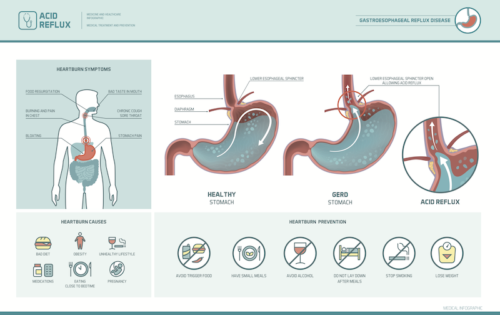What is GERD?
An estimated 1 in every 5 American adults suffers from GERD. It is a chronic condition caused by changes in the gastroesophageal valve (GEV) that allow contents to flow from the stomach back into the esophagus. Left untreated, GERD can be a lifelong disease. It can lead to bothersome symptoms, which can vary from mild or moderate to severe depending on the person.
- Typical symptoms: burning sensation in the chest (heartburn), regurgitation of food or sour liquid (acid reflux) and difficulty swallowing (dysphagia)
- Atypical symptoms: sensation of a lump in the throat (globus), asthma, chronic dry cough, chronic sore throat, laryngitis and hoarseness, dental erosions and non-cardiac chest pain
GERD is not an “acid” problem. Instead it is caused by an anatomical issue. The acid our stomach produces is important for digestion, killing harmful bacteria and helping with the absorption of electrolytes and other nutrients from the foods we consume
GERD occurs when the valve between the stomach and the esophagus is not working properly and fails to keep contents in the stomach. Medications may offer mild to intermittent symptom control, but they do not stop or prevent reflux. Additionally, those who are or may become dependent on daily medication may develop severe complications from GERD, even if no symptoms are experienced. When left untreated, GERD can lead to other health complications including:
- Damage to the throat or esophagus
- Inflammation or narrowing of the esophagus
- Respiratory complications
- Barrett’s Esophagus
- Esophageal cancer
How common is GERD?
GERD is the most common gastrointestinal related diagnosis made by physicians during clinical visits in the U.S. It’s estimated that pain and discomfort from acid reflux impact over 80 million people at least once per month in the U.S.
How can I relieve GERD symptoms?
GERD can have a significant impact on a patient’s quality of life through persistent typical and atypical symptoms, inconsistent sleep patterns, dietary restrictions, additional health care costs and lost productivity from work.
If lifestyle modifications are not effective in reducing your GERD symptoms, it is important for GERD sufferers to know that there are endoscopic and minimally invasive procedures, like the TIF procedure for reflux, that can help restore proper function to the faulty valve and relieve your GERD.
How is GERD Diagnosed and Treated?
Some of the most common ways doctors can test for GERD include:
- Upper Endoscopy: Also known as an EGD, this test works by an insertion of a thin tube that has a camera and a light into the throat.
- Barium Swallow: X-Ray image of the upper GI tract.
- Bravo Reflux Testing: A minimally invasive procedure to measure acidity levels with a small, wireless capsule.
- pH Impedance Testing: With the insertion of a catheter into the nose, guided towards the esophagus, pH levels of the amount of acid in the esophagus is measured over a 24 hour period.
- Esophageal Manometry: A catheter is placed into the nose, then into the esophagus to measure the pressure of the muscles in the esophagus.
Can I Have a Normal Life With GERD?
With the right treatment plan and lifestyle changes to best manage symptoms, you can live a normal life with GERD.
What Foods Should I Avoid With GERD?
Avoiding foods that trigger GERD can be helpful as it can alleviate symtpoms and make life feel more normal. Foods and beverages that can trigger GERD include:
- Chocolate
- Alcohol
- Coffee
- Citrus
What Foods Help With GERD?
While there are foods to avoid if you are suffering from GERD, there are foods which can help such as:
- High fiber foods like sweet potatoes, oatmeal, and carrots
- Bananas and other foods with alkline
- Waterfy fruits and vegetables like watermelon and cucumber
- Milk
- Ginger
It can be helpful to keep a food diary to track which foods you find yourself more reactive to since some foods may not trigger GERD for you as it would for others.
Beyond diet changes, consider managing your weight and stress through exercise and a healthy sleep schedule.
Are GERD and Acid Reflux The Same?
GERD and acid reflux are similar, but the terms are not interchangable. The main difference between GERD and acid reflux is that GERD is more of a serious condition than acid reflux, and can lead to more servere complications. However, acid reflux can progress to GERD. Acid reflux and GERD symptoms are typically the same.
Nonprescription Options for GERD
While it is always advised to contact your doctor prior to taking any medications to treat symptoms of GERD, here are some medicines that may help:
- To Neutralize Stomach Acid: Tums and Rolaid
- To Reduce Acid Production: Protone-pump inhibitors (PPIs) and H2 blockers
- To Prevent Acid Production and Heal Esophagus: Prilosec OTC
Prescription Options for GERD
If you and your doctor decide to take prescribed medications for GERD, here are some common ones:
- Esomeprazole
- Lansoprazole
- Omeprazole
- Declansoprazole
Does GERD Ever Completely Go Away?
GERD can not go completely away on its own. Your provider may suggest lifestyle changes, medication, or procedures if needed.
Get Treatment for GERD in Nashville, Tennessee
If you have or suspect you have GERD, contact your doctor to schedule an evaluation and discuss the issue. Please visit our virtual GERD treatment page, or GERDHelp.com for more information or to find a physician in your area who can help.

